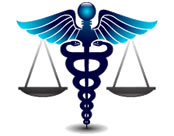

Medical Malpractice Connections

- Access for Laparoscopic Surgery - Negligence
- Anesthesia Negligence
- Breast Cancer Negligence
- Cardiac Surgery Negligence
- Cardiology Negligence
- Common Bile Duct Injury - Negligence
- Critical Care Negligence
- Gastroenterological Negligence
- Hospital Negligence
- Neurosurgery Negligence
- OB-GYN Negligence
- Orthopedic Negligence
- Psychiatric Negligence
- Radiologic Negligence
- Surgical Negligence
- Thoracic Surgery Negligence
- Vascular Surgery Negligence
Psychiatric Negligence
Because of legal definitions and criteria that must be met, it is difficult to define what constitutes psychiatric medical malpractice. In addition, due to prejudices facing those persons suffering from mental illness the number of suits filed and the size of the settlements awarded are considerably less than other areas of medical malpractice. However, there are examples of instances that should be considered psychiatric malpractice.
Physician/Patient Sexual Contact
Sexual contact between psychiatrists and their patients is one of the few examples considered uniformly as malpractice.
Breach of Confidentiality
The doctor/patient relationship and the inherent confidentiality associated within this relationship is considered sacred in the medical community. Patient confidentiality is defined as the right an individual patient has, to personal identifiable medical information to be kept private. Such information should be available only to the physician of record and other health care and insurance personnel as indicated by the patient. Breach of this confidentiality should be considered medical malpractice.
Abandonment
Medical abandonment results when the doctor-patient relationship is terminated without making reasonable arrangements with an appropriate person so that care by others can be continued. Due to the potentially fragile state of the patient and adverse reactions that can be associated with prescribed medications, frequent visits and close monitoring and supervision is often required in the psychiatric patient population. Thus such, abandonment of the patient by the psychiatrist can be considered negligence.
Medication Related Negligence
Unlike other areas of medical practice, psychiatrists often will begin treatment before reaching a diagnosis. Prescription medications will rather be given to treat symptoms instead of the disease process. This practice, though common, has the potential for serious consequences. Often the same symptoms can present themselves in several different disease states, making it easy for misdiagnosis to occur. This practice can also lead to the over prescribing of medications with disregard for signs of ineffectiveness, tolerance, side effects, or addiction. These days with the highly publicized cases of celebrities overdosing on prescription medication the public is more sensitized to the lack of oversight, control, and consequences of psychiatrists prescribing such medications. This overprescribing of medications with inadequate monitoring for symptoms of addiction and/or side effects should be considered medical malpractice.
| Top of page |
| Home | Medical Malpractice Attorneys | Medical Experts | Medical Negligence | Services | Statute of Limitations | About Us | Contact Us |